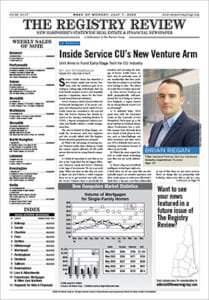
The Securities and Exchange Commission wants to require public companies, including stock banks, to disclose climate-related risks to their businesses. But the impacts could be felt more broadly in the financial industry.
As the federal government moves closer to requiring publicly traded companies, including stock banks, to disclose information related to climate change, other banks and even credit unions could feel the effects.
The Securities and Exchange Commission has proposed a rule that would require public companies to take a standardized approach to disclosing climate-related risks to their businesses and other related information, a move the SEC said would give investors more consistent, comparable and reliable information. The agency has also said its Examinations Division will focus considerable efforts this year on analyzing public companies’ broader claims to investors who weigh firms on the basis of environmental, social and governance factors.
Since credit unions and many New Hampshire-based banks are not publicly traded, the proposed rules would not apply to all Granite State lenders. But as investors and consumers become accustomed to climate disclosures, other organizations could face pressure to start sharing information about their environmental, social and governance initiatives, including those involving climate change.
Some Lending to Be Scrutinized
A consumer survey by Virginia-based research firm Rockbridge found that 68 percent of respondents said they like to do business with companies that are environmentally responsible. But consumers do not want companies to just say they are environmentally responsible. The study found that 72 percent of survey respondents wanted companies to be sincere in their message.
The SEC proposal would give investors, ratings agencies and institutional investors information that they could use to better understand and make decisions about companies, including through enhanced or new valuation models, said Maura Hodge, the ESG audit leader with KPMG IMPACT in Boston.
“Even though many companies are starting to report more, the level and the quality of that information is generally not high,” she said. “These proposals … are going to force companies to up their game and really increase and enhance the way that they think about and talk about climate-related risks and opportunities.”
The SEC’s nearly 500-page proposal was released on March 21, and the agency accepted public comments for 60 days before finalizing the rules. The rules would apply to public companies and those going through an initial public offering, though some businesses, including smaller ones, would not be subject to all requirements.
Under the proposal, firms would typically have to provide specific metrics and disclosures on financial statements, including the impact of climate-related risks. They would also have to report – and have an auditor confirm – the company’s direct greenhouse gas emissions, known as “scope 1 emissions,” as well as “scope 2 emissions,” which involve sources for the company’s power supply. Some companies would also report on “scope 3 emissions,” which cover supply chains and, in the case of banks, could include investment and lending relationships.
Other disclosures are similar to guidelines released five years ago by the global Task Force on Climate-Related Financial Disclosures, created by the Financial Stability Board, that help companies assess their exposure to climate risks and provide this information to investors. And companies that have already taken steps to mitigate these, such as scenario analyses or establishing plans to transition away from carbon-emitting power sources, would have to disclose this information.
“The absence of that disclosure indicates or implies that you as an organization haven’t done it, and maybe you aren’t necessarily taking climate risks as seriously as others,” Hodge said.
While developing ESG programs will be a focus for publicly traded banks preparing to comply with climate disclosure rules, other institutions could eventually see their operations affected as well.
“I do think that even private companies will have some or much of [the proposed rules] to comply with as well, if nothing else, the greenhouse gas emissions reporting and potentially the financial information,” Hodge said.
Customer Interest on the Rise
Until the SEC proposal – and perhaps other climate rules bank regulators might introduce – has been implemented, though, its effects on other types of banks will not be felt right away, said Chris Roughton, a manager in the business technology advisory practice at Baker Newman Noyes who works with small and midsized enterprises.
But community banks have started to ask about the potential impacts of climate reporting, he said.
Community banks have also seen interest in how they manage ESG and climate change from depositors, borrowers, community organizations and municipalities, Roughton said. Internally, he added, employees and boards are also looking to understand what banks are doing about climate change.
Roughton said he has heard some skepticism from mission-driven companies about ESG and climate disclosures because they are already engaged in the community and perhaps even reporting on their initiatives.
“Where this ESG movement is going toward really is about comparability and usefulness for customers, for investors as they look at: Where am I putting my money?” he said.
Community banks might find that some of these standards are similar to what they are already doing, Roughton said, noting that banks should take credit for the efforts already taken while trying to understand where more work is needed.

